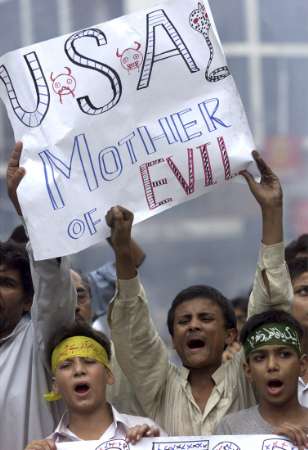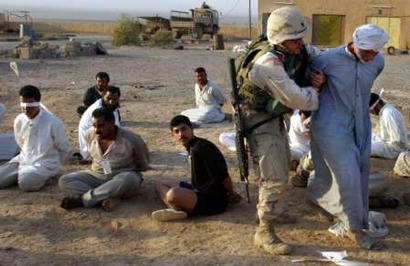Home > English > Politics > Iraqi resistance fueled by economic plundering, repressive rule
Iraqi people are fighting for their jobs and households, not international terrorism
 Iraqi resistance fueled by economic plundering, repressive rule
Iraqi resistance fueled by economic plundering, repressive rule
Poverty and uncertainty in Iraq force people into resistance
Thursday 20 November 2003, by
The ongoing war in Iraq is portrayed as an ideological war between cultures and civilisations, between the Occident and the Arab world, and for a radical minority on both sides, between Christianity and Islam. This "Clash of Civilisations" is the best pseudo-intellectual trash the present US administration has used to explain and thus justify its present occupation of Iraq, its ressources and its economy.
In June 2003, the United States Labor Against the War (USLAW), the International Liaison Committee of Workers and Peoples (ILC) and the International Confederation of Arab Trade Unions (ICATU) officially decided to send a delegation to Iraq in October to inform the International Labour Organisation, which seemingly was not doing the job done itself, of the economic conditions of the Iraqi population under the US-led occupation.
This delegation reported in Chicago on October 25th about the impending misery of the Iraqi population and the catastrophic economic situation of the country. The unemployment rate in Iraq has reached 70%, and labor activism is tightly controlled by the Occupation Authority. None of the labor unions which have regrouped since the collapse of Hussein’s regime have been recognised by the OA. Worst of all, the OA refuses to abrogate and continues to enforce the 1987 Iraqi law which forbids Labor Unions in the public service. In other words, 60% of the workers and employees in Iraq have today no right to unionize.

The official reason is of course that this law must be maintained as a precaution measure against terrorism and social unrest. But there are many other advantages for the OA to prevent the Iraqi workers to regroup and defend their economic and professional interests in the reorganisation of the country.
The leading national industries of this state-led economy are in the process of being subjected to foreign investment by multinationals, and the Iraqi labour has lost one of the rare advantages of working under Saddam’s regime: job security, as well as meager but stable jobs. Iraq was a rich, developed society by material standards before the first Gulf war and the human disaster of the UN embargo which followed brought it to its knees.
In Irak, clean water and electricity are not functioning regularly or often not even available. Schools and hospitals are desperately trying not to shut down. British journalist Robert Fisk estimates that about 1,000 Iraqis are dying every week since the occupation. And a recently leaked CIA intelligence report indicates that this situation will probably get worse.
The Occupation Authority froze wages to 6 dollars an hour, but cut on all incentive bonuses, profit-sharing, as well as food and housing subsidies, which has led inevitably to further impoverishment of the Iraqi population. The US administration is not "liberalising" the Iraqi economy, it is redirecting Iraqi national wealth towards its own interests. Indeed, the OA recently issued a decree, Public Order 39, allowing 100% foreign ownership of Iraqi companies, and the repatriation of profits to multinational headquarters. All extraction industries are planned to be privatized.

Confronted to these illegal, criminal procedures and methods, the Iraqi population will undoubtedly not tolerate full-blown expropriation of their ressources, their economy and their society. After 10 years of living under the embargo, it may be resoluted enough to face these new hardships. If the US administration continues to fuel the resistance by its continued authoritarian and repressive rule in Iraq, it will face a long-lasting war. Nowadays we can hear a lot about a "second Vietnam", but this war has more Palestinian overtones.
The war in Iraq today is being portrayed by our governments and official media the same way as Palestine: it’s not a war, and indeed its unprecedented parameters does not give it the features of a regular war. The war as it is understood has ended in May, yet since the end of October more US soldiers were killed during the occupation than in the military invasion. And still the military and administrative authorities in Iraq and Washington DC assure the public that the constant guerilla and suicide attacks are "terrorist activities".
The truth is, the Iraqi population is being forced to endorse Resistance groups whose prerogatives may indeed not be that commendable. But the reason why these groups exist in the first place, as they have been for half a century in Palestine, lies in the repressive rule of the Occupation Authority, the legal screen administration behind which Iraq is being reconfigured to suit the needs of industrial and financial globalisation.
Thus, by reducing the social unrest in Iraq to a simple problem of "terrorism", by highlighting the power of religious shiite leaders, by associating the suicide attacks against the UN in Baghdad in October 2003 with "International terrorism", the US are not even granting the Iraqi population the right to be recognised as victims as a whole.

Victims of an authoritarian administration backed up by a foreign military, which is sacrificing their incomes, their resources and their country to foreign interests.
The Iraqi population is indeed not presented in Europe, and certainly not in the US or in Asia, as victims. The analysis in most TV and newspaper reports stops at the anger of the Iraqi population, but cannot afford to mention the roots of this anger. There is practically no information given on the social and economic realities of Iraq, or the daily hardships of its population.
But daily reports of terrorising work conditions, such as underpaid workers being constantly aimed at the workplace by the guns of US marine guards, add to the indiscriminate brutality demonstrated by the US army as the war of occupation nestles in, and which is caused by this climate of terror they help to feed.
This allows the official line in Washington or at Fox News to explain the guerilla war in Iraq in terms of "International Terrorism". And play the very dangerous game that Israel has chosen in its own war of occupation.
Goerges W Bush has included in his list of ennemies in Iraq members of the Al Qaeda terrorist group which were according to him and his administration operating in Iraq. A commander of the 82nd airborne division, Maj Gen Charles Swannak, declared however his men were fighting Iraqi insurgents from the former regime.
Peace and prosperity in Iraq can only be possible if the bulk of the population is given minimum social and civic rights. The Occupation Administration and Colin Powell must have realised that long ago, I am not sure about the others. But even if its a known fact for everyone in Washington and Baghdad, it simply isn’t a sizeable argument next to the enormous profits that will be engendered for the benefit of the US economy.
An international labor delegation from the USLAW led Campaign will travel to Geneva in the coming weeks in November to deliver its conclusions and its appeal to the ILO officials.
It demands that several ILO conventions be immediately implemented in Irak, such full trade union rights in Iraq, the immediate nullification of the 1987 Hussein law banning unions in public enterprises and for the repeal of any other restriction on the full exercise of labor rights. Others include ILO Conventions 87, 98 and 138, guaranteeing the rights to organize and bargain collectively and prohibiting child labor.
Go to the USLAW website to learn more about US labor against the war in Irak and to support the delegation in November 2003.